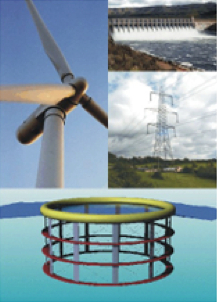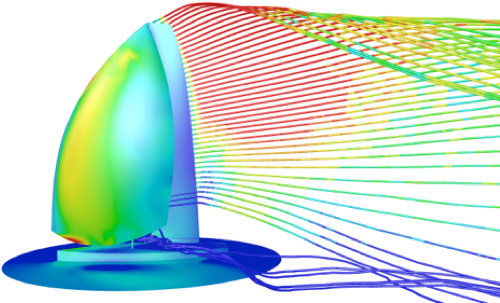Bio inspired foils for low speed performance of renewable energy converters |
|
|
Closing Date: TBC Improvement of the efficiency of wind and tidal energy converters is crucial in order to make these technologies competitive compared to traditional energy systems. In particular, while it is important to improve their performance over a wide range of flow speeds, it is known that foils designed for high speed exhibit poor performance at low speed. The present research aims at investigating the underlying mechanisms of a particular flow feature observed close to insect wings and bird wings, namely the leading edge vortex, and to investigate how this feature can be used to improve the efficiency of renewable energy converters at low speed conditions. The project will be based on analytical and computational methods. The PhD student will be erolled at the University of Edinburgh under the principle supervision of Dr Ignazio Maria Viola For further information, please follow this link. |
 |
A numerical and experimental investigation into the aerodynamics of yacht sails |
|
|
Closing Date: TBC The proposed project aims to investigate the fluid dynamics of yacht sails. Sails have unique flow features, which allows the generation of very high lift and high lift/drag ratio compared to wings and blades commonly used in other fields such as aeronautics and turbo machinery. The project aims to understand the underlying mechanisms of these flow features in order to allow the performance of sails to be further enhanced and, importantly, to allow the cross fertilisation of ideas research fields where there is a need for fluid dynamic efficiency. |
 |
|
The flow field around sails has several uncommon characteristics. The sharp leading edge leads to laminar separation followed by laminar-to-turbulent transition and then by turbulent reattachment, forming a leading edge vortex (LEV). LEVs are known on flat plates with a sharp leading edge and on delta wings, while on rounded-nose foils used for low-pressure turbines a similar features known as the laminar separation bubble (LSB) occurs. In the present project, it is proposed to test large-scale flexible sails in a wind tunnel to measure forces and the flying shape of sails, and then to build a rigid small-scale model to be tested in a water tunnel in order to perform flow measurements with LDV and PIV. Experimental measurements will be complemented with computational fluid dynamics (CFD) in order to test a wide range of conditions, which are tested with difficulty experimentally. In particular, numerical experiments will be performed with LES and DNS on 2D extruded geometries in order to investigate the natural-transition mechanisms on LEV. It should be noted that DNS, LES and water experiments have never been used to investigate the fluid dynamics of sails. The PhD student will be enrolled at the University of Edinburgh under the principle supervision of Dr Ignazio Maria Viola For further information, please follow this link. |
|
